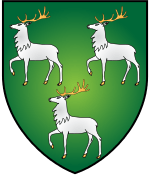John Habakkuk
Sir Hrothgar John Habakkuk (13 May 1915 – 3 November 2002) was a British economic historian.
Biography
Habakkuk was born in Barry, Vale of Glamorgan, Wales, the son of Evan and Anne Habakkuk. He was named "Hrothgar" after Hroðgar in Beowulf, which his father was reading at the time of his birth. However, he came to be known as John when he started to travel to the United States, and when he was knighted he found it easier to call himself "Sir John" than "Sir Hrothgar".[1][2] His surname was assumed by a seventeenth-century forebear after the prophet Habakkuk, it being a Welsh custom at that time to take patronymics from the Bible.[2][3]
He was educated at Barry County School and St John's College, Cambridge (scholar and Strathcona Student, starred[2] first class degree in History 1936).[1] (He was not, as sometimes erroneously stated, connected with Jesus College, Cambridge).[4] He began to study for a PhD under John Clapham, but his progress was interrupted by the Second World War.[1] In 1938, he was elected a Fellow of Pembroke College, Cambridge, a position he held until 1950. He worked in the Foreign Office 1939–42 and the Board of Trade 1942–46, during which period he still found time to carry out research at the Public Record Office and in the archives of country houses.[1][2] After World War II, he was from 1946 until 1950 Director of Studies and Librarian of the college and Lecturer in the Faculty of Economics. In 1973, Pembroke College elected him to an Honorary Fellowship. From 1950 until 1960, he was editor, with Michael Postan, of The Economic History Review.
In 1950, he moved to Oxford, where he would remain for the rest of his life. At the age of just thirty-five he had been appointed Chichele Professor of Economic History in the University of Oxford and Professorial Fellow of All Souls College. He held this appointment until 1967, when he became Principal of Jesus College. He also served as Vice-Chancellor of Oxford University (1973–77)[5] and Pro-Vice-Chancellor (1977–84). He retired in 1984 and was Ford Lecturer in the following year.[1] All Souls re-elected him to a fellowship in 1988. He was also President of University College, Swansea from 1975 until 1984 and an honorary fellow of the college from 1991. He was Visiting Professor at Harvard University 1954/5 and at University of California, Berkeley (Ford Research Professor)[2] 1962/3.[4](mentor to author Kenneth Gordon Davies)
Habakkuk was elected a Fellow of the British Academy in 1965[6] and a member of the American Philosophical Society in 1966.[4] He was appointed Knight Bachelor in 1976. In the same year he began a four-year term as President of the Royal Historical Society. He was awarded the degree of Doctor of Letters honoris causa by the Universities of Wales (1971), Cambridge (1973), Pennsylvania (1975), Kent (1978), and Ulster (1988).
He was a member of the Advisory Council on Public Records 1958–70, the Social Science Research Council 1967–71, the National Libraries Committee 1968–69, the Administrative Board of the International Association of Universities 1975–84, and the Royal Commission on Historical Manuscripts 1978–90. He was Chairman of the Committee of Vice Chancellors and Principals of the Universities of the United Kingdom 1976–77, the Advisory Group on London Health Services 1980–81,[2] and the Oxfordshire District Health Authority 1981–84. He was president of the Royal Historical Society (1977–1981),[7]
Habakkuk was married to his former student,[4] Mary Richards (died 2002),[1] in 1948. They had a son and three daughters. He died, from renal failure and myelodysplasia, at the house of one of his daughters, Little Orchard, Scot Lane, Chew Stoke, in Somerset, England, on 3 November 2002.
Publications
- John Habakkuk, Marriage, debt, and the estates system: English landownership 1650–1950 (Oxford: Clarendon Press, 1994).
- John Habakkuk, Population growth and economic development since 1750 (Leicester: Leicester University Press, 1971).
- John Habakkuk, Industrial organisation since the Industrial Revolution (Southampton: University of Southampton, 1968).
- John Habakkuk, American and British technology in the nineteenth century: the search for labour-saving inventions (Cambridge University Press, 1962).
- John Habakkuk et al., Lectures on economic development=Études sur le développement économique (Iktisat Fakültesi nesriyatı no. 101, Istanbul: Faculty of Economics, Istanbul University, and Faculty of Political Sciences, Ankara University, 1958).
- H.J. Habakkuk, 'English Landownership, 1680–1740', Economic History Review 1st series 10.1 (February 1940), pp. 2–17.
See also
References
- F. M. L. Thompson Obituary, The Independent (11 November 2002)
- Obituary, The Telegraph (18 November 2002)
- Marshall, P. J., ed. (2005). "Biographical Memoirs of Fellows III". Proceedings of the British Academy. 124. p. 91.
- David Landes, Proceedings of the American Philosophical Society Archived 27 September 2007 at the Wayback Machine vol. 149, no. 1 (March 2005), pp. 99–101.
- "Previous Vice-Chancellors". University of Oxford, UK. Retrieved 14 July 2011.
- British Academy Deceased Fellows Archived 6 June 2011 at the Wayback Machine
- "List of Presidents". Royal Historical Society. Archived from the original on 16 July 2011. Retrieved 20 December 2010.
Further reading
- Boyd, Kelly, ed. Encyclopedia of historians and historical writing. Vol. 1 (Taylor & Francis, 1999) 505-6.
- Debrett's People of Today (12th edn, London: Debrett's Peerage, 1999), p. 816.
- Thompson, F.M.L. ed. Landowners, Capitalists, and Entrepreneurs: Essays for Sir John Habakkuk (Oxford University Press, 1994).
External links
- Sir John Habakkuk: Biographical Memoir
- Obituary
- Catalogue of Habakkuk's papers concerning a proposed history of the Iron and Steel Board, held at the Modern Records Centre, University of Warwick
| Academic offices | ||
|---|---|---|
| Preceded by John Christie |
Principal of Jesus College, Oxford 1967–1984 |
Succeeded by Sir Peter North |
| Preceded by Lord Bullock of Leafield |
Vice-Chancellor of Oxford University 1973–1977 |
Succeeded by Sir Rex Richards |
| Preceded by Geoffrey Elton |
President of the Royal Historical Society 1977–1981 |
Succeeded by J. C. Holt |
